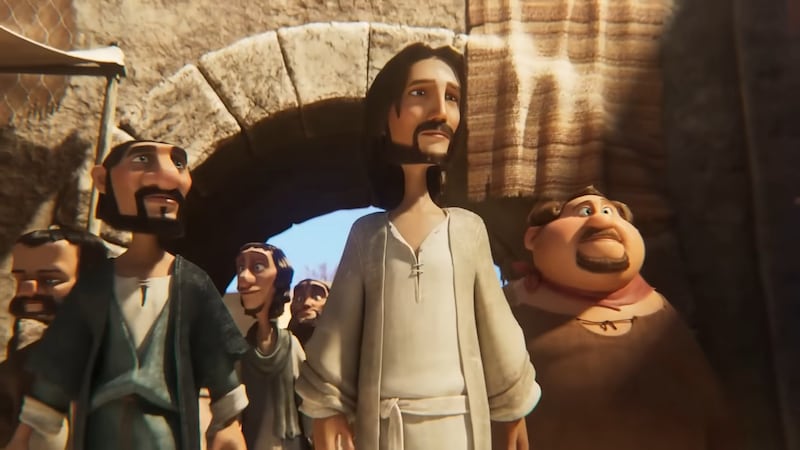Somehow, Jesus returned.
That’s both a glib summary of what happens in the new Easter-season animated movie The King of Kings and a description of this cut-rate attempt by Angel Studios to revive the Biblical epic.
Angel became an unexpected industry player on the strength of its smash hit Sound of Freedom a few years back, and has been regularly releasing faith-based entertainment ever since. Freedom’s religious tell was employing true believer Jim Caviezel – a once and possibly future king-of-kings himself – in place of an actual marquee name, and most of Angel’s subsequent films have been similarly lacking in the surprising star power that used to turn up in Christian movies from bigger studios like Sony.
The King of Kings, however, is easily Angel’s most star-studded production yet, at least in the audio booth, where trod the likes of Kenneth Branagh, Uma Thurman, Pierce Brosnan, Forest Whitaker, Ben Kingsley, Mark Hamill, the kid from Jojo Rabbit, and, somehow, Oscar Isaac as Jesus.
As the hippest member of the voiceover cast, Isaac may seem like the most inexplicable, too. On the other hand, he’s the only actor here who might just barely qualify as young enough to hold a cherished childhood memory of The Prince of Egypt, the 1998 DreamWorks cartoon from back when it looked (however briefly) like the upstart studio’s competition with Disney might yield greater variety in the field of American animation.

OK, Isaac would have been nearly drinking age when that movie came out, but it still makes sense as the model for The King of Kings in execution and movie-star enticement; Egypt is a beautifully animated and well-performed adaptation of the Book of Exodus. By comparison, the new film looks as if it’s being acted out by bobble-heads.
It’s also an unnecessarily complicated production. Though the New Testament overview of The King of Kings follows many of the same beats as the 1961 live-action film of a similar name (back then, they dropped “the”; it’s cleaner), this cartoon is purportedly based on the Charles Dickens book The Life of Our Lord.
This explains the framing device where, yes, Charles Dickens (Branagh), fresh off the mildest possible disagreement with his young son Walter (Roman Griffin Davis), entices the King Arthur-obsessed child with a bedtime story about another king with a loyal group of followers, wink wink. (The movie entirely elides the fact that this Dickens “manuscript” was written for him to read to his family, never intended for publication, and that the author expressly forbade it from release, preferably forever but at least until such time as all of his children were dead—at which point the widow of his final surviving son sold it for a tidy sum. Thirty pieces of silver, was it?)

Branagh is admittedly well-cast as a version of Dickens who seems to quite enjoy the sound of his own voice. But the movie makes a bizarre decision presumably designed to draw in contemporary children, who famously love anything nineteenth-century: As Charles over-narrates a greatest-hits package of Christ stories, he and Walter, along with their pudgy cat, sometimes step into the frame, simulating a first-person account as observers of Jesus’s life. As far as Dickens-and-small-sidekick interjections go, Gonzo and Rizzo they are not.
In fact, this decision creates an uncomfortable dramatic distance between the audience and Jesus; far from making his story human and relatable, he looks even more totemic and remote as Walter’s emotions and his father’s footnotes hand-hold, guide, and even prod the young target audience into having the correct reactions. The non-Biblical characters (which also include wife and mother Catherine, barely-voiced by Thurman) add very little in return; any attendant Dickensian flourishes in the writing have been replaced by wan, ill-fitting cat antics.

This leaves little room for Issac’s presence. He does maintain an appealing combination of serenity and authority, but he never really gets to play a character. Every line, even at their gentlest, feels like a pronouncement; several of his deliveries also sound a bit like Pedro Pascal. (There are also a few distractingly contemporary touches, as when Christ tells his followers “go ahead, I’ll wait,” like he just dropped some knowledge on social media.)
What Isaac really does is help illustrate how great animation performances must be shared by the voiceover actor and the animators. Surely Korean visual-effects guru Seong-ho Jang, making his directorial debut here, knows this. But in addition to Jesus’s aforementioned resemblance to something that might jiggle slightly on a dashboard (his neck is disturbingly thin!), the whole computer-animated ensemble doesn’t look designed or stylized so much as approximated. It’s an artistic decision that says: This is what computer-animated people look like, right? This is the standard?

There are a few stray moments of The King of Kings that take full advantage of the medium; the scene where Jesus walks on the surface of a storm-tossed sea has such an eerie beauty that it brings to mind, well, Prince of Egypt again, and how animation holds the potential to revive so many moribund genres. The King of Kings, though, is just another church-sales magnet, a movie that thinks it’s reaching out while existing mainly to lull the already converted. This is not the resurrection you’re looking for.
The post What in God’s Name Is Oscar Isaac’s New Jesus Movie ‘The King of Kings’? appeared first on The Daily Beast.



















